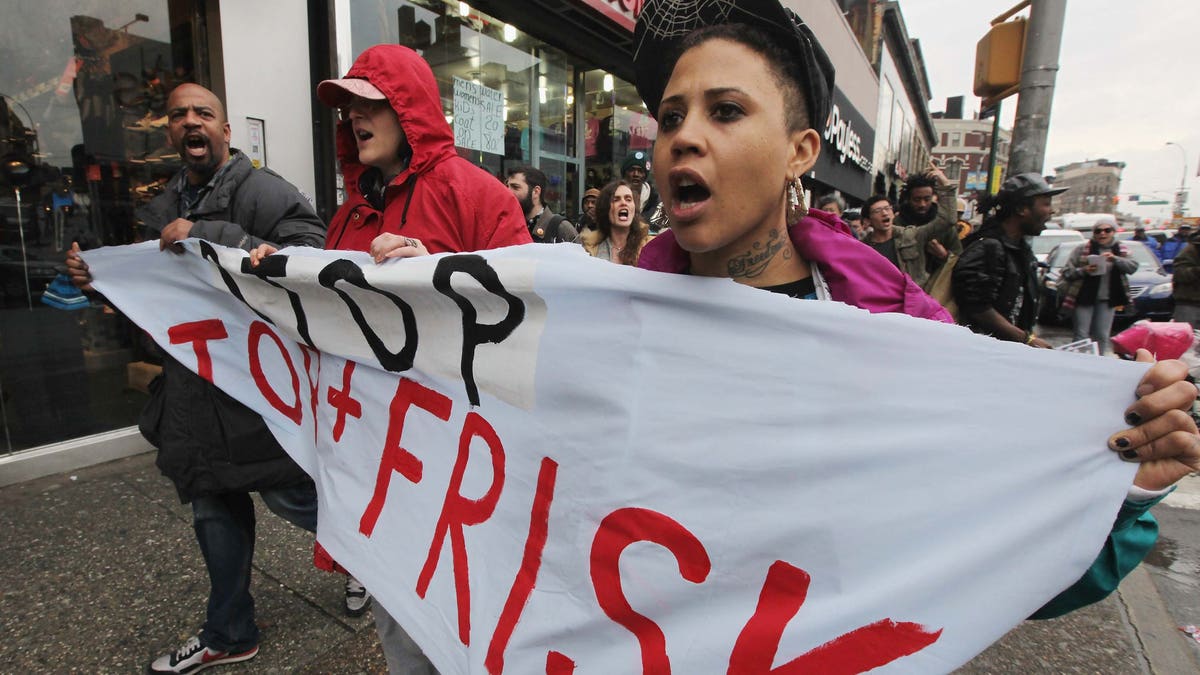
Opponents of the New York Police Department's controversial "stop-and-frisk" policy march. (2012 Getty Images)
“Just as I came out of the subway at 116th Street and Lexington Avenue, I saw my son being frisked by these two cops,” the mom of a 21-year old, college bound, black high school student recounted her own deeply emotional experience with New York’s controversial Stop-and-Frisk program.
“I ran over yelling, ‘keep your hands off my boy!’ I almost got myself arrested.”
Happily, her encounter ended happily. No contraband was found on her son and apologies were exchanged all around.
A counselor for disabled children, she was one of three hard-working, African-American mothers who happened to be at a dinner at my New York apartment. So I seized the opportunity for an impromptu focus group on the issue that dominates local news in the Big Apple these days: what to do about Mayor Michael Bloomberg’s controversial program that last year saw 684,330 people stopped by NYPD cops, even though they were committing no obvious crime.
87% of the people stopped were black or Latino, although they represent just 52% of city population. The stops are highly intrusive. Yet while supposedly based on the cop’s reasonable suspicion that “criminal activity is afoot,” the stops are also of questionable effectiveness. Just 10% result in either an arrest or a summons. Weapons are found in only one in every 1,000 stops.
Still, Mayor Bloomberg and his granite jawed police commissioner Ray Kelly are convinced that few guns are seized precisely because the desperadoes fear being stopped and frisked. They point to cities like Philadelphia (aka ‘Kill-adelphia) with about 20 murders annually per 100,000. And Chicago, where barely a weekend goes by without multiple homicides, and where there are 15 murders per 100,000. By contrast, New York averages just over six murders per 100,000. And let’s be real. The reason so many of the stops involve kids of color is that it’s where the crime is. Endemic poverty, widespread drug abuse and absentee fathers are a toxic mix here as elsewhere.
“I was speaking with two black cops in my neighborhood the other day,” one of the moms continued. “And these two cops were talking about the ‘Lost Generation’, how so many of these teenagers and twenty year olds out there today have no dads. So many of the men were locked up during the crack epidemic. Their children, especially the boys, are raising themselves. They don’t care about you. They don’t even care about themselves. So I think the program has some value,” the city-wise mom admitted, “if only they were more polite.” Then she added angrily, “And, if the stops were colorblind.”
The second black mom in my tiny focus group is a pediatric nurse at a major New York hospital. She doesn’t have a son, but she does have a now 30-year old brother who has been stopped numerous times. “I see the need for the program. But I’m definitely not sold on targeting and the sensitivity. Why is it just the people of color who are inconvenienced?”
The third mom is a guidance counselor at a prominent Manhattan private school. Both her children are daughters. “I almost feel guilty about having this perspective, but sometimes I see these kids hanging around out there and I know that nothing good is happening there. I make sure that I’ve got my hands on my iPhone or iPad. They scare the crap out of me. But I don’t like that it’s only the black and Latino kids who are stopped. I was walking past a group of white kids the other day, and they were definitely on meth or something. And I was wondering where are the cops now?”
From this tiny sample, three points emerge that I believe accurately reflect how most minority mothers in New York feel about Stop-and-Frisk.
1- It has value,
2- Cops need to be much more selective, professional and polite,
3- Racial profiling is unacceptable.
Further, the consequences of a police stop must be proportional. Right now, if kids are stopped and marijuana is discovered, they are charged with misdemeanor drug possession. Although prison sentences are seldom imposed on first offenders, they do carry a criminal record that forever bars the offender from a city job, and often starts them on the long, sad road to more serious crime and incarceration. New York governor Andrew Cuomo wants to reduce possession of less than 7/8 ounce of pot to a violation, which is not a crime and does not carry a criminal record.
That is a step in the right direction and it is consistent with Police Commissioner Kelly’s recent directives to his officers essentially not to be arrogant bullies. But after speaking with the three moms, I am more convinced than ever that Stop-and-Frisk is one of the important reasons New York is among the world’s safest big cities.







































